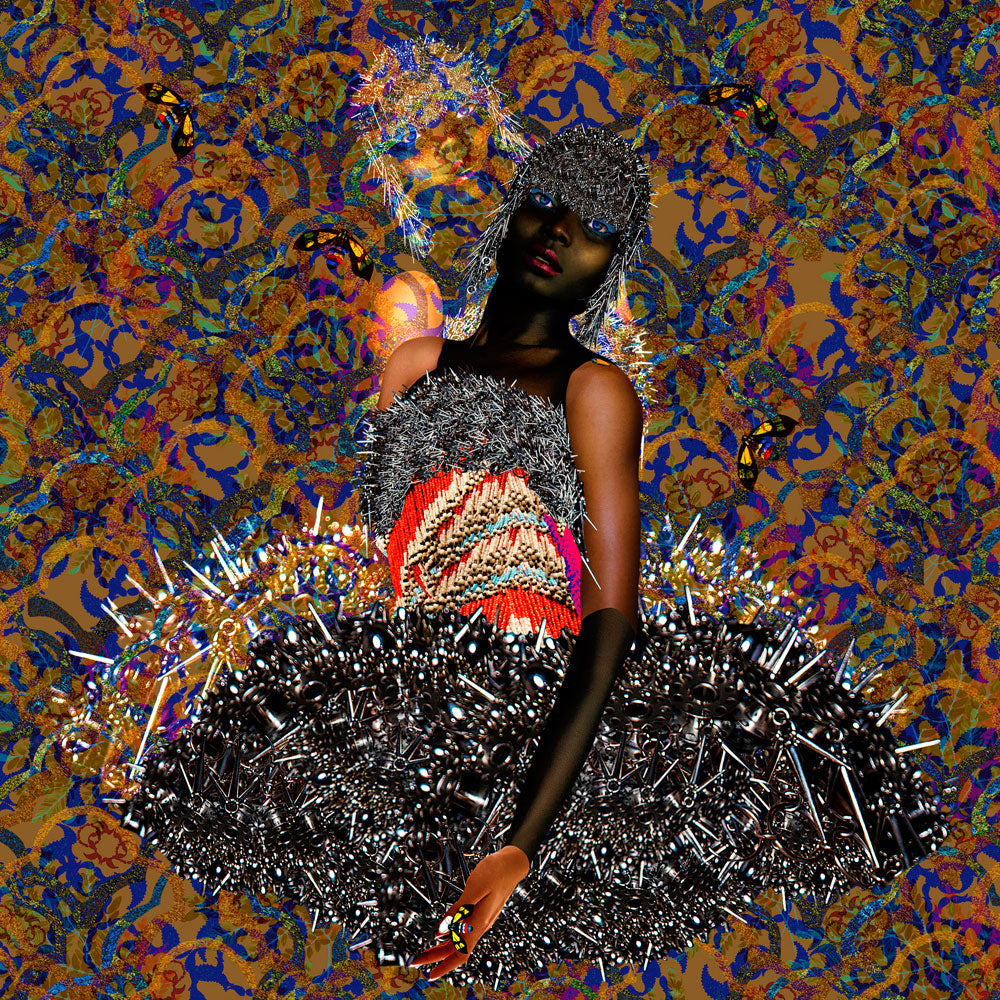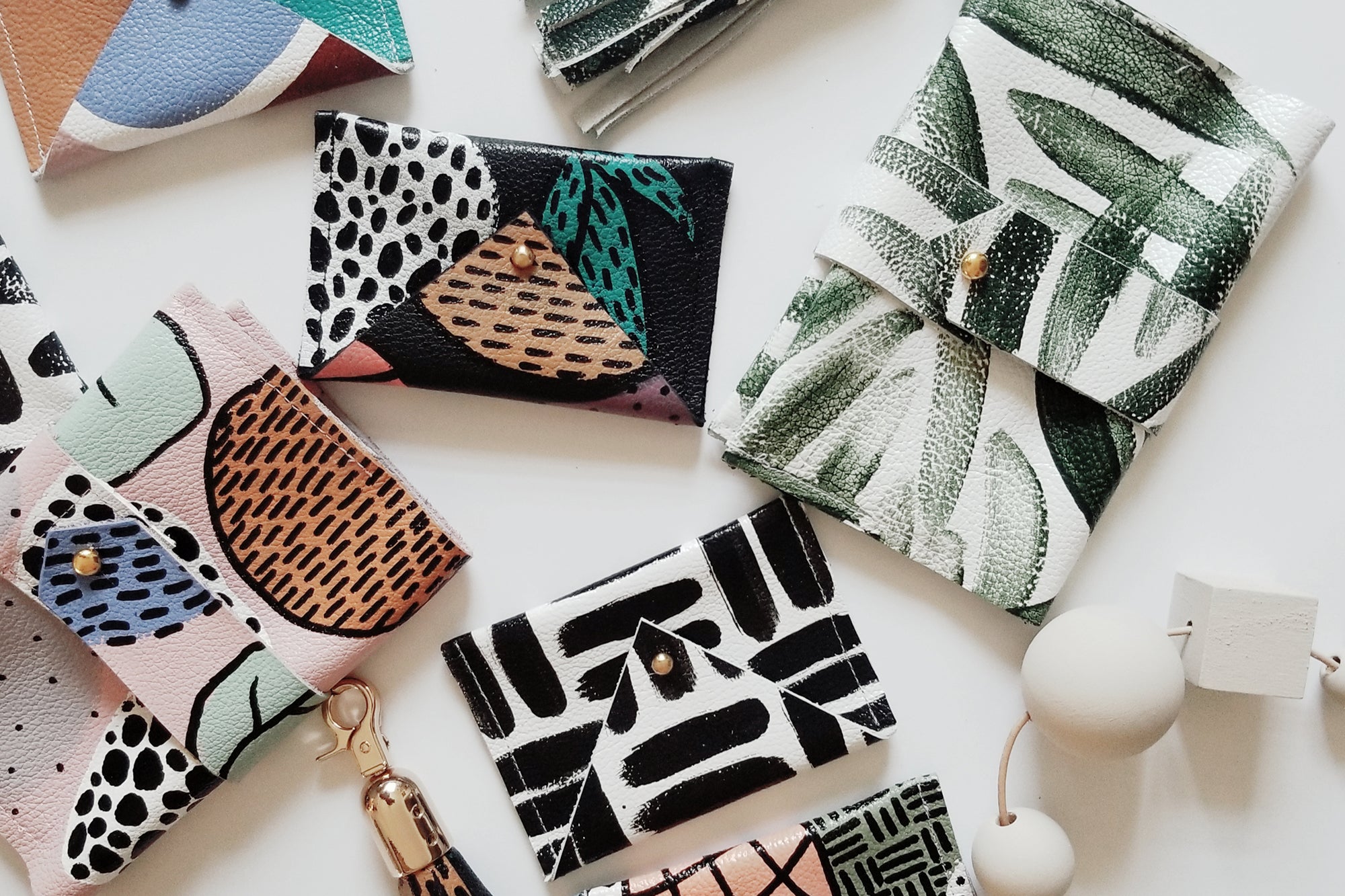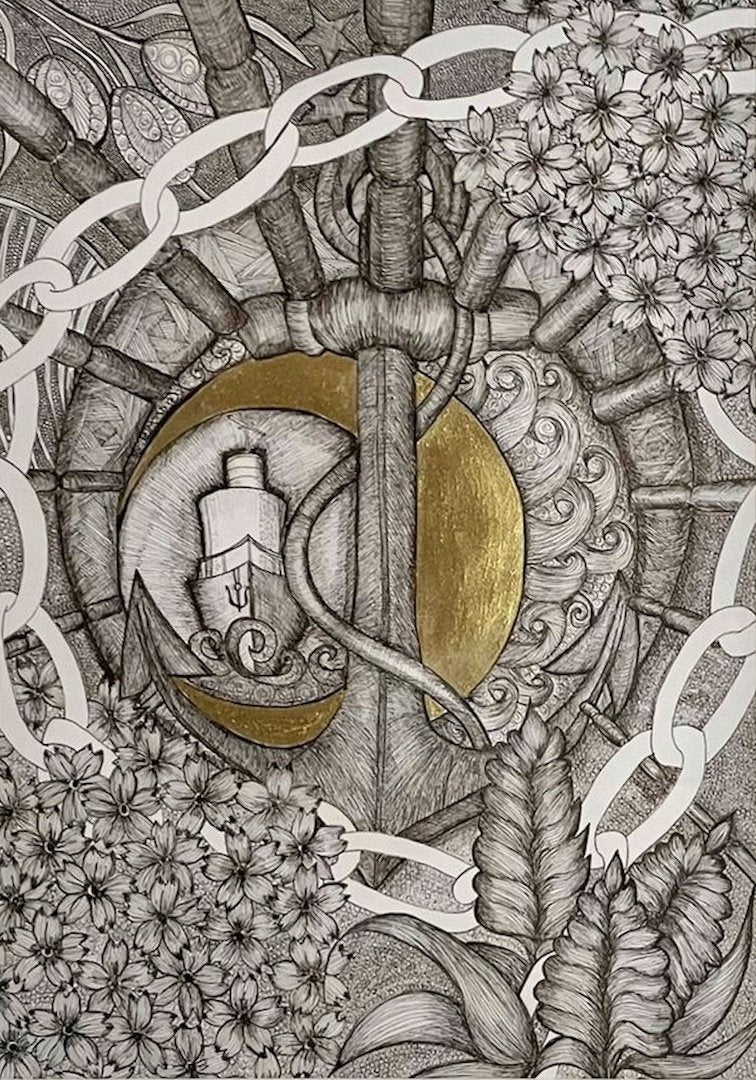
Caroline Chinakwe Takes on Colourism in Her New Collection
ln her new artistic series titled 'Colourism', Caroline Chinakwe, London-based stylist turned artist, and creator of lifestyle and interiors brand Chinakwe, tackles one of the primary issues she feels global black communities are facing today. Often the subject of controversy frequently referred to in hushed tones, colourism is a subject that has long been hidden away from the spotlight. Now, Caroline Chinakwe hopes to shed more light on the nuances surrounding the issue with the hope that this collection will finally start much needed conversation.
Caroline's recently launched brand Chinakwe offers a range of Afro-lux fashions and customisable premium soft furnishings including velvet reupholstered vintage chairs, Chichester footstalls, lampshade, and satin and velvet cushions.
 Pictured: Caroline Chinakwe
Pictured: Caroline Chinakwe
Obviously, you have a fashion background. What made you decide to transition to art and product design?
I transitioned to art because I wanted to put out images that reflected my culture that I wasn’t able to produce in fashion. The types of models I wanted to work with in fashion, I didn’t have access to them. The type of styling I wanted to see, I couldn’t really put it together. So, the easiest thing for me to do was to collage them together myself. Look at models that I really wanted to work with, find them online and collage the type of styling I wanted to do using different mediums.
Initially, it wasn’t meant to be for me to get into art, it was just really for me to put together a portfolio of work of what I could do for people to see in order for them to hire me as a stylist. People were messaging me about the art and calling it art. It took me a little while to accept the fact that it was art, because for me not coming from an art background I was looking at art in a traditional way. You know, someone painting something on a canvas, not even photography. Photography was photography and art was oil painting or acrylic painting on a canvas. Before I started exploring digital art, I didn’t know that digital art existed in that way. I just saw a few things that I liked, but I didn’t really pay much attention to it. So, when people were calling me an artist and I started looking at what other artists were doing I was like ‘oh ok, yeah it could be art.'
How has it been for you navigating the art world as someone coming from a fashion background? Have you noticed any stark differences, and have you encountered any hurdles?
There's a huge difference, even though they’re both creative and between a lot of art and fashion there is definitely a huge crossover. Artists are always used as an inspiration in fashion, we see that all the time, but they're still two very different industries. Coming into an industry that I knew nothing about and didn’t appreciate to its fullest at all, it was really hard for me, and that’s why I think it took me so long to actually get into it. I appreciated art but I wouldn’t call myself an art-lover honestly, I didn’t know anything about it. It was kind of daunting. I felt like I would have to really research, and I did research in terms of what other artists were doing. Who were the black artists in the industry that were turning heads? Who were people speaking about and excited about? What did I think about them? Which artists inspired me? All the kind of questions that I would want to know from an artist, I started preparing myself for them. I just thought, ‘whatever, this is my art. It speaks for itself.'
"Sometimes as an artist you have to do what you love doing, and what means something to you. If people love it they get it. If they don’t, they don’t. You have to get to a point where you love it, and you know the message."
It’s still an industry that I’m learning about and just connecting with the right people, getting an exhibition is something that I’m working towards. I actually have my first exhibition coming up next month. The thing with black female artists is that in the UK there's not much room for us to shine, as there’s not much room for black women in any industry full stop. The art world is really a socially elitist world where it’s really about who you know, that's really similar to the fashion industry. It's really about who you know, it’s not really about the talent. It’s about are you the flavour of the month. Are you the one that they’re going to put out and say that you’re interesting, that you’ve got something to say. It’s controlled by white middle-aged men and I found myself in a similar situation just like I was in fashion, where just trying to get that space to showcase yourself was and is really really hard. I hope that the industry will start recognising that there are some really amazing black female artists in the UK that really need support.
Success, Caroline Chinakwe
What three words would you use to describe your art?
Unapologetic. I know it’s a word used a lot by black people, but that's absolutely what it is. It’s bold. When I say bold, I don’t just mean the colours. It’s just really in your face because it’s meant to say, this is us. Take it or leave it. Using big lips for instance, obviously you see me, and I have big lips, it was something that I realise that I grew up hating until I realised how sexy it was. You had people calling you names because of your big lips and then suddenly loving them. It’s something that as black people we have in abundance, so making sure people see our features and appreciate our dark skin, the boldness comes from that. The third word that I would use is culture. When you look at my work you can see a mixture of both my African background and western upbringing.
"It was my way of contributing to the talk of racism, and really looking at ourselves as black people to say that yes, we are tackling racism and it's a big issue, but it’s a world issue. It’s not really our issue, it’s other people’s issue. What is our issue is colourism."
How has it been launching your new art collection 'Colourism' in lockdown?
I wanted to create my next series during lockdown because I thought what better time than right now to actually put together something when I’m not interrupted. It was hard to get inspiration because I wasn’t able to go out and see things and take pictures. So, I had to be really creative in terms of where I got my inspiration from. As things carried on in 2020, ideas kept coming through and with everything happening with George Floyd’s murder, the protests, and everything that we were going through ‘Colourism’ came about. It was a big risk for me because initially I was thinking of going back to what people know me as- bright bold colours. ‘Colourism’ is a lot more muted. Different types of tone, it’s using tones of brown, blacks, and oranges. I knew that people may not have been sure about that, but it was just so meaningful to me.
Black men with darker skin receive one kind of treatment, and women with darker skin tones receive another. While we’re tackling racism, we just need to really look at other things that are going on in our communities. This is my personal way of contributing to the changes that are going on around the world on the back of this collection and really wanting to start that conversation, which is something that I’m still doing. It’s a reminder for our people to look within ourselves as a people and see how we can help heal ourselves. It’s been received well. People have got it. Not as many people have got it as I would have liked, but people are still having those conversations and coming to me to have them.
 Chinakwe
Chinakwe
Have you ever had a personal experience with Colourism, and what do you think could be done to breakdown the foundations of its legacy within communities?
We need to talk about it! I think it’s something that we just don’t talk about enough. I mean there’s a lot of issues in our community that we don’t talk about. Especially as Africans, we don’t notice what’s going on around the world. Yes, Africans live on a continent, and we have our own issues. We have our issues with politics and social economics and the disparity between the rich and the poor, absolutely. However, on a larger scale we’re not taught enough about our history, we’re not taught enough about the different black people all over the world. How they got there, and how we're still one. We’re just not having conversations enough between ourselves. I think that more people need to talk about colourism and understand the significant impact that it has on our society, on our ‘race’, on our culture, on ourselves individually, and on our next generations. We need to talk about how it’s still impacting them and how it’s still affecting black young girls till tomorrow growing up with this lack of confidence because of their skin tone.
Even though social media has played a part in highlighting all this black beauty, and you’ve got all this melanin this and melanin that, black girl magic and all this stuff, I don’t think it’s reaching where it still needs to reach. People are saying it because black girls want to feel good about themselves and be recognised as beautiful, not just something like a token or a contrast to white skin, which I feel is used a lot in magazines where they want to have this white girl and then have the contrast of this black girl next to her. Not that they’re recognising the beauty in her, just recognising the difference. They think we’re stupid and don’t see what’s happening.
Let's have this conversation amongst ourselves and understanding that our kids are also feeling this way. They also feel that they’re not good enough, they feel that they’re not beautiful enough and our boys are feeding into that still. They're saying that they’d rather have a light-skinned girl. They are saying that dark-skinned girls are not beautiful, that they wouldn’t want to be with one. This is a conversation that’s happening in 2021, so until we start talking about it more and going back to our kids and saying, ‘listen, how do you feel about a lighter skinned girl? Do you know how beautiful you are?’, unless we’re having these conversations, it’s not going to go anywhere. It’s just going to carry on getting worse.
 Queen, Caroline Chinakwe
Queen, Caroline Chinakwe
What message do you hope that your brand Chinakwe will give to your audience?
There’s not enough black-owned brands out there that give you homeware and that give you lifestyle. I mean, there’s a few online but there’s just not enough on the high street. I’m hoping that I will create a brand that will be the brand that is on the high street that people can buy into. I want to create a brand that black people can feel proud of, that they can feel that yes this is me, this is who I am, this evokes all my ideas and aesthetic. Whether it’s one piece that brings your home to life, or whether it’s accessories, I’m hoping that larger brands like hotels and restaurants will also buy into it. It’s really me just putting something out there that’s different to what we expect from a black-owned brand.
What would you like us to know about you?
As a start-up business, as a female black creative, I would want people to feel inspired by my brand and know that anybody can do this. I want more women and men to create brands that we can feel proud of, that our children can feel proud and know that there’s a representation of them in the world. I want us to buy more into our brands as black people because we have that power and elevate ourselves. I’m blessed to know that most of my customers are from the culture, which is great to know that we do support ourselves. For many years we have said that we don’t support, but we do. We have a voice, we have a strong selling power. I want us to all go out there and make changes.

Chinakwe
To buy any of the six pieces available on BetterShared from the 'Colourism' series click here.





Leave a comment
This site is protected by hCaptcha and the hCaptcha Privacy Policy and Terms of Service apply.